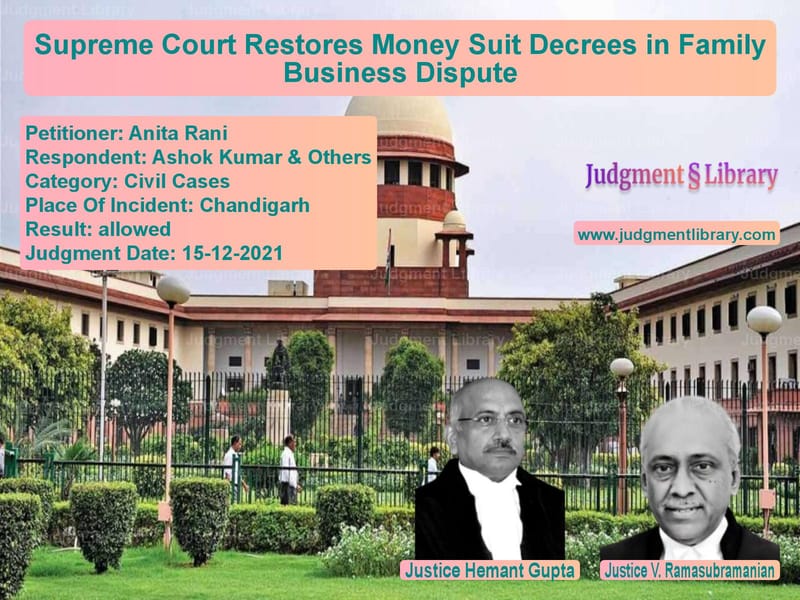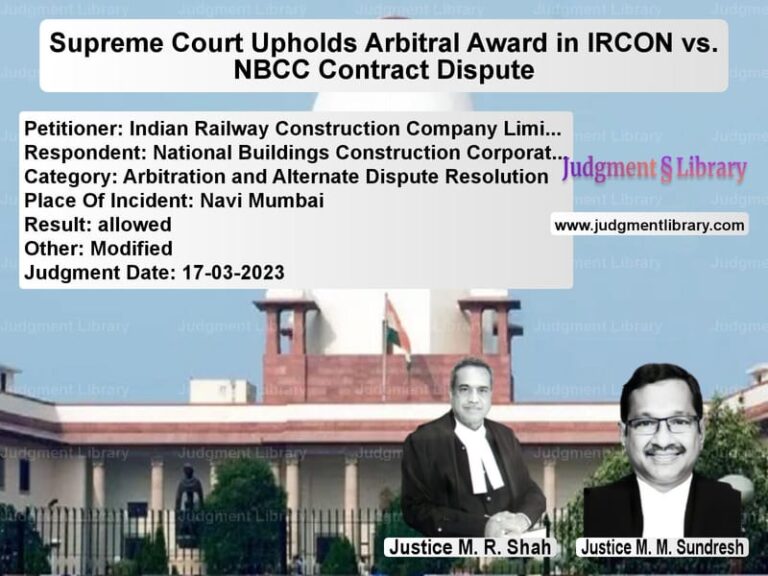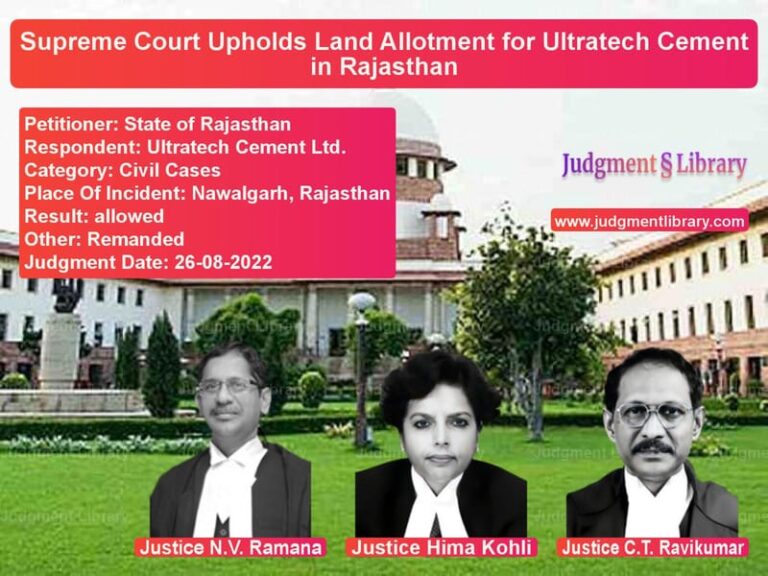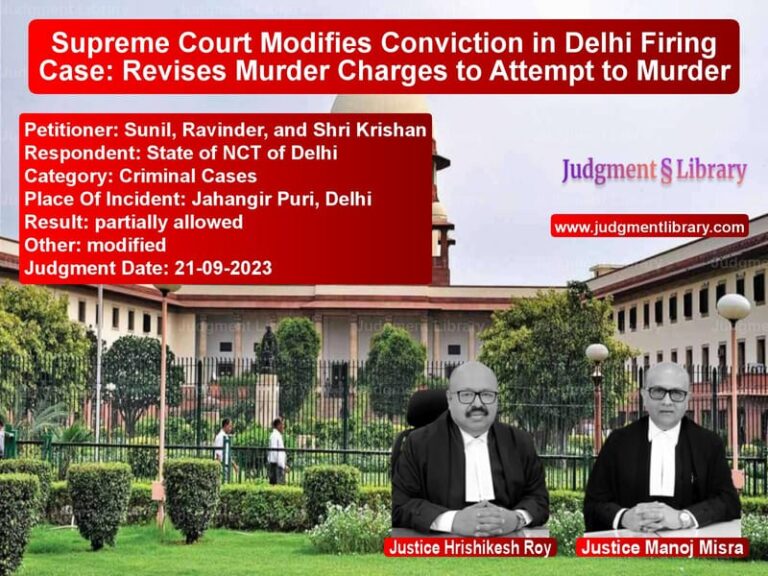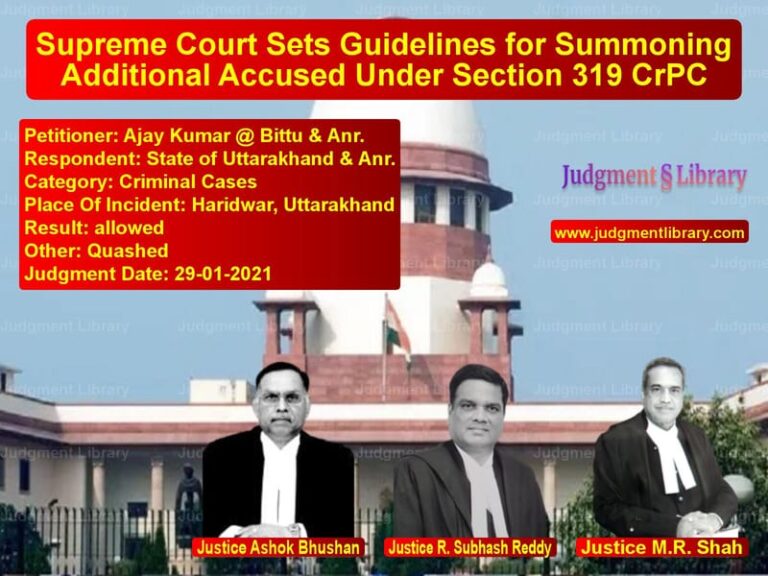Supreme Court Restores Money Suit Decrees in Family Business Dispute
The Supreme Court of India recently ruled in Anita Rani vs. Ashok Kumar & Others, overturning the Punjab and Haryana High Court’s decision in a dispute over money transactions within a family-run real estate business. The case involved two civil suits filed by the appellant, Anita Rani, against her husband’s relatives for recovery of money allegedly misappropriated from her bank account.
Background of the Case
The case originated from two separate suits filed by Anita Rani in 2007 before the Civil Judge (Junior Division), Chandigarh:
- First suit (Civil Suit No. 15643/2007): Seeking recovery of Rs. 10,48,000.
- Second suit (Civil Suit No. 15592/2007): Seeking recovery of Rs. 67,31,000.
The respondents in the case were Ashok Kumar, his wife (Anita Rani’s husband’s sister), and their son. The dispute arose from financial transactions involving their real estate business and alleged misappropriation of funds from the appellant’s bank account.
Read also: https://judgmentlibrary.com/supreme-court-upholds-high-court-order-in-telangana-land-dispute-case/
The trial court dismissed both suits, but the First Appellate Court reversed the decision, decreeing the claims in favor of Anita Rani. However, the Punjab and Haryana High Court, in a second appeal filed by the respondents, overturned the decree and directed the appellant to refund Rs. 55,00,000 received through anticipatory bail proceedings.
Legal Issues Raised
- Whether the transactions between the parties were loans or investments in a family business.
- Whether the respondents misused blank signed documents to withdraw funds from the appellant’s bank account.
- Whether the Punjab and Haryana High Court erred in setting aside the First Appellate Court’s decree.
- Whether oral evidence from third-party mediators could establish a full and final settlement.
Petitioner’s Arguments (Anita Rani)
- The appellant claimed that the respondents withdrew funds from her and her son’s joint bank account without authorization.
- She alleged that they had forged her signature on a cheque of Rs. 25,00,000 and misused signed blank papers to withdraw an additional Rs. 42,31,000.
- She contended that she had no knowledge of these withdrawals until she reviewed bank records in 2006.
- She also stated that she had lodged an FIR against the respondents for fraud and forgery under Sections 420, 467, 468, and 471 of the Indian Penal Code.
- The First Appellate Court correctly found that the money was misappropriated and ordered its recovery.
Respondents’ Arguments (Ashok Kumar & Others)
- The respondents argued that the appellant and her husband were involved in a joint real estate business with them since 2001.
- They claimed that the funds withdrawn from the appellant’s account were investments made in the business.
- They produced an affidavit allegedly signed by the appellant’s son, stating that Rs. 30,00,000 was given as a payment made out of love and affection.
- They contended that the payments were settled through third-party mediation and that Rs. 5,00,000 paid in August 2006 was in full and final settlement.
- They relied on oral testimony from mediators to support their claim of settlement.
Supreme Court’s Verdict
The Supreme Court, in a bench comprising Justices Hemant Gupta and V. Ramasubramanian, ruled in favor of the appellant, setting aside the Punjab and Haryana High Court’s judgment.
The Court observed:
“Once money is admitted to have been received by the defendants, the burden shifts to them to prove either a discharge or that the payments were gratuitous. In the present case, the respondents failed to provide any written proof of settlement.”
Key Observations by the Supreme Court
- The respondents admitted to receiving the money but failed to produce any documentary evidence supporting a full and final settlement.
- The alleged affidavit signed by the appellant’s son, which purportedly stated that Rs. 30,00,000 was given out of love and affection, was not signed by the appellant herself and was, therefore, not binding on her.
- The trial court erred in relying on oral evidence from third-party mediators to establish settlement.
- The appellant had successfully proven that the respondents misused blank signed documents to withdraw funds.
- The Punjab and Haryana High Court’s order for refunding Rs. 55,00,000 was beyond the scope of the appeal and legally unsustainable.
The Court ruled:
“The judgment of the High Court is set aside, and the decree passed by the First Appellate Court is restored.”
Final Order
- The Supreme Court allowed the appeal and restored the decree passed by the First Appellate Court.
- The appellant was granted a decree for Rs. 10,48,000 in the first suit and Rs. 67,31,000 in the second suit, with interest.
- The respondents’ plea of full and final settlement was rejected.
- The appellant was awarded Rs. 50,000 as litigation costs.
Key Takeaways
- Burden of proof in financial disputes: When a defendant admits receiving money, the burden shifts to them to prove repayment or settlement.
- Oral evidence cannot override documentary proof: The respondents’ failure to produce a written settlement agreement was fatal to their defense.
- Forgery and misuse of documents: Courts take a strict view when transactions involve misuse of blank signed documents.
- High Courts must exercise appellate jurisdiction carefully: The Supreme Court emphasized that High Courts cannot go beyond the scope of an appeal.
This judgment reinforces the legal principle that money transactions between family members must be carefully documented and that oral claims of settlement require strong documentary support.
Petitioner Name: Anita Rani.Respondent Name: Ashok Kumar & Others.Judgment By: Justice Hemant Gupta, Justice V. Ramasubramanian.Place Of Incident: Chandigarh.Judgment Date: 15-12-2021.
Don’t miss out on the full details! Download the complete judgment in PDF format below and gain valuable insights instantly!
Download Judgment: anita-rani-vs-ashok-kumar-&-others-supreme-court-of-india-judgment-dated-15-12-2021.pdf
Directly Download Judgment: Directly download this Judgment
See all petitions in Contract Disputes
See all petitions in Debt Recovery
See all petitions in Fraud and Forgery
See all petitions in Damages and Compensation
See all petitions in Judgment by Hemant Gupta
See all petitions in Judgment by V. Ramasubramanian
See all petitions in allowed
See all petitions in supreme court of India judgments December 2021
See all petitions in 2021 judgments
See all posts in Civil Cases Category
See all allowed petitions in Civil Cases Category
See all Dismissed petitions in Civil Cases Category
See all partially allowed petitions in Civil Cases Category

